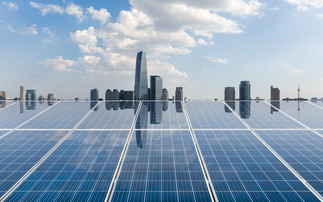The Solar Trade Association's Leonie Greene urges government to help create a pool of talent, but could industry be doing more too?
Earlier this month, the government unveiled its long-awaited solar strategy, designed to ramp up investment in the burgeoning sector and increase capacity nearly six-fold by the end of the decade.
Tucked away in a raft of commitments to increase the deployment of solar panels on schools and boost R&D efforts, was a pledge to "encourage the industry to open up employment in the sector to greater numbers of women".
Further details on how exactly government will encourage more women into the sector have yet to be decided, but it is widely recognised that like the rest of the energy industry, the solar sector is failing to achieve a good gender balance.
Around 15,000 to 16,000 people are currently thought to be working in the solar industry in the UK. Like many clean tech sectors the industry tends to attract young and progressive employees keen to work in dynamic companies that are delivering both environmental benefits and financial success.
However, Leonie Greene at the Solar Trade Association (STA) argues that there are still far too few women working in solar, although she admits that to date nobody has counted how many. "We can all be pretty confident from the number of events we run and go to that the proportion of women in the industry is pretty slim," she tells BusinessGreen.
The government's latest commitment to working with the industry to improve gender balance is certainly a positive step forward. But is it enough?
Greene believes that the government should be going one step further, and launching a full-scale renewable energy skills strategy for the entire industry that would help better align the curriculum with the needs of the green economy and create a pool of technicians and engineers capable of delivering both the solar strategy and growth beyond 2020.
"If you think about the number of women in lower paid, lower quality jobs and young people coming through then you can see how a skills strategy would really help," she says. "We desperately need as many women as we can in technical roles. But it's also a subset of a bigger problem. We're all concerned that the average age in the energy industry tends to be quite old, so a lot of those experts are going to be retiring and we're poised for a real brain drain in the energy sector."
However, she agrees some of the responsibility lies with solar companies to bring more women into the sector. There is a growing concern that some parts of the industry are really not helping themselves, with some insiders complaining about the emerging culture of "booth babes" parading at industry trade shows. While this might help pull in the punters, it is clearly sending the message to women that the industry does not always live up to the progressive image it likes to project.
The problem (hopefully) reached its nadir last summer when Greek solar panel firm Recom showcased women dressed as cats in a cage at last summer's Intersolar show in San Francisco. Although the UK shows tend not to be quite so exploitative, the "booth babe" culture is still present at some trade events. "It kind of suggests actually we're not expecting women to turn up," Greene adds. "It needs stamping out because if it carries on going down that pathway, it's self-fulfilling and they're just going to alienate women. It's just crass and patronising and stupid because it's an intelligent technology which attracts intelligent people."
After receiving a mailbag of criticism, Recom agreed to fund two scholarships for women working in solar to attend UC Berkeley's Executive Leadership Program, but insiders have warned the industry still needs to take a more proactive approach to addressing gender imbalance if it wants to solve the problem.
Greene agrees that a quota system for women in executive roles would be a good idea, despite the controversy attached to such targets. However, given the deep subsidy cuts that the solar industry has faced over recent years, she is concerned that many firms are too financially squeezed to develop their own gender equality strategies and invest in training.
However, she does admit it is slightly inconsistent for green companies to make this argument on one hand, while criticising other companies that refuse to invest in clean technologies for the same reasons, despite the long-term benefits both would deliver.
The Department for Energy and Climate Change (DECC) says it is in the process of developing a programme to work with the sector to help it encourage more women into solar jobs and will engage with industry in due course. But as any initiative will be voluntary, solar firms will have to take steps to address the problem themselves if they wish to retain their reputation as part of a progressive and socially responsible industry.










